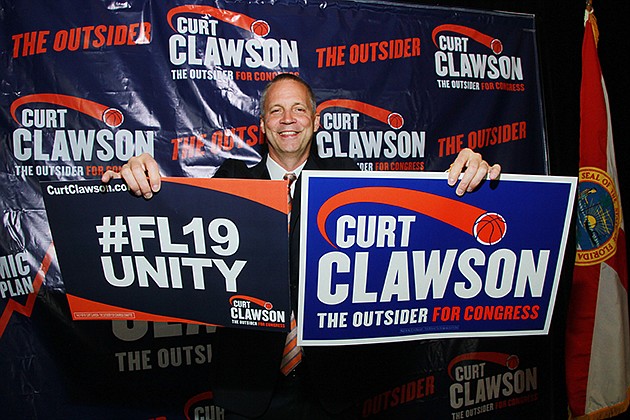- November 21, 2024
-
-
Loading

Loading

After watching former corporate CEO Curt Clawson run for Congress, why would anyone want to subject himself to such an ordeal? If you're a successful business owner or executive who wants to run for public office, consider Clawson's experience first.
A relative unknown in Southwest Florida, Clawson recently defeated better-known candidates to win the Republican primary for the U.S. House of Representatives in District 19, a seat vacated by Trey Radel, who resigned after his arrest on possession of cocaine. Clawson's opponents included State Sen. Lizbeth Benacquisto, a rising Republican star who is now majority leader in the state senate.
Clawson is widely expected to go on to win the election against Democrat April Freeman and Libertarian Ray Netherwood in this mostly conservative district that includes Fort Myers, Bonita Springs and Naples..
But the special-election primary victory came at substantial cost, both financially and personally. Clawson, 54, the former chairman and CEO of automotive supplier Hayes Lemmerz, spent more than $3 million, much of it in the form loans to his campaign. In addition, unflattering profiles in the local newspapers spread doubts about his candidacy.
Clawson retired from the automotive business in 2012 and lives in Bonita Springs, near where his parents have lived for 20 years. But few people outside Bonita Springs knew who Clawson was until he launched his campaign. “This is the third time I've repotted myself,” says Clawson, a college basketball star and former CEO of a publicly traded company.
An intensely private person, Clawson acknowledges privacy was a concern and the outcome was uncertain. “I knew enough to know that we really can't predict the future,” he says.
When he was CEO of Hayes Lemmerz, the largest manufacturer of steel and aluminum wheels for cars, he preferred to head off to the gym for a workout rather than hobnob with industry executives after hours. “I was Mr. Privacy CEO,” Clawson says.
Three of Clawson's six brothers and sisters tried to dissuade him from running, knowing he was publicity shy. “No one said it would be fun,” Clawson says. But, he adds, “It was easier for me because I don't have a wife and kids.”
Still, he was concerned about any impact his candidacy would have on his family. “As long as they didn't hit ancillary targets, I was OK,” he says. Anyhow, he was thoroughly vetted when he became CEO of Hayes Lemmerz, a $2.2 billion company, he says.
Clawson acknowledges coming across as stiff and camera-shy. “It took me a while to learn to get our message out with the press and be natural,” he says. “I had to let my own personality out of the bag.”
Clawson launched his campaign with a splash by running a television ad that ran during the Super Bowl, generating headlines and interest. And the “outsider” strategy worked as his poll numbers surged early on in the campaign.
But seasoned opponents weren't going to give up easily.
Initially, Clawson says he had anticipated spending $1.5 million. “I was surprised by the Super PAC attacks,” he says, referring to special-interest groups that attempted to derail his candidacy once the early polls showed him clearly ahead.
As he saw his poll numbers falling because of these attacks, Clawson boosted his campaign spending on media advertising to counter them. “That was the big inflection point,” Clawson says.
Looking back, Clawson says he has no regrets about the extra money he spent. “I always knew if we won I wouldn't regret it,” he says. “It's the admission price to be part of the solution.”
Could $3 million have been better spent on another worthy political cause? “We'll find out,” Clawson says.
Clawson says the best campaign marketing was a 20-page booklet explaining his plan to lower taxes, reduce government spending and boost job creation. “More people said I voted for you because I got this in the mail,” he says.
A Harvard University M.B.A. graduate, Clawson built his campaign much like he organized his businesses. He hired strategic political consultant John Yob, who has advised U.S. Sen. John McCain and others. Bonita Springs City Councilman Peter Simmons became his campaign manager, arranging for him to meet with supporters.
Initial polls showed an outsider candidate with a business background would do well, even against well-liked politicians such as Benacquisto. “Our competitors also polled positive,” Clawson says. “They had much more name recognition.”
Clawson says he structured his campaign much like he ran Hayes Lemmerz. He hired the best people and let them do their jobs. “I wasn't going to micromanage,” he says. He approached business the same way. “If I hire a plant manager, I'm going to let him go,” he says.
Clawson says he encouraged his entourage of advisers to disagree with him and each other. “I needed them to argue in front of me,” he says, leading him to make better decisions.
Some of the most intense debates were over what some may consider trivial matters. For example, they debated whether Clawson should be filmed shooting a basketball for the Super Bowl ad. “I didn't want to come across as a frivolous guy,” Clawson says. “I'm a serious person.”
Clawson says he doesn't have any advice for executives who want to run for office, except this: “Whatever way you run your business, that's how you should run your campaign,” he says. “I ran my business my way, but it worked for us.”
Follow Jean Gruss on Twitter @JeanGruss